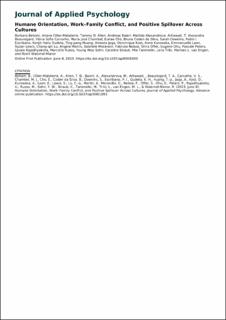Humane Orientation, Work–Family Conflict, and Positive Spillover Across Cultures
| dc.contributor.author | Beham, Barbara | |
| dc.contributor.author | Ollier-Malaterre, Ariane | |
| dc.contributor.author | Allen, Tammy D. | |
| dc.contributor.author | Baierl, Andreas | |
| dc.contributor.author | Alexandrova, Matilda | |
| dc.contributor.author | Artiawati, T. | |
| dc.contributor.author | Beauregard, T. Alexandra | |
| dc.contributor.author | Carvalho, Vania Sofia | |
| dc.contributor.author | Chambel, Maria José | |
| dc.contributor.author | Cho, Eunae | |
| dc.contributor.author | Coden de Silva, Bruna | |
| dc.contributor.author | Dawkins, Sarah | |
| dc.contributor.author | Escribano, Pablo I. | |
| dc.contributor.author | Gudeta, Konjit Hailu | |
| dc.contributor.author | Huang, Ting-pang | |
| dc.contributor.author | Jaga, Ameeta | |
| dc.contributor.author | Kost, Dominique | |
| dc.contributor.author | Kurowska, Anna | |
| dc.contributor.author | Leon, Emmanuelle | |
| dc.contributor.author | Lewis, Suzan | |
| dc.contributor.author | Lu, Chang-qin | |
| dc.contributor.author | Martin, Angela | |
| dc.contributor.author | Morandin, Gabriele | |
| dc.contributor.author | Noboa, Fabrizio | |
| dc.contributor.author | Offer, Shira | |
| dc.contributor.author | Ohu, Eugene | |
| dc.contributor.author | Peters, Pascale | |
| dc.contributor.author | Rajadhyaksha, Ujvala | |
| dc.contributor.author | Russo, Marcello | |
| dc.contributor.author | Sohn, Young Woo | |
| dc.contributor.author | Straub, Caroline | |
| dc.contributor.author | Tammelin, Mia | |
| dc.contributor.author | Triki, Leila | |
| dc.contributor.author | van Engen, Marloes L | |
| dc.contributor.author | Waismel-Manor, Ronit | |
| dc.date.accessioned | 2024-02-15T12:45:26Z | |
| dc.date.available | 2024-02-15T12:45:26Z | |
| dc.date.created | 2023-06-20T14:03:43Z | |
| dc.date.issued | 2023 | |
| dc.identifier.issn | 0021-9010 | |
| dc.identifier.uri | https://hdl.handle.net/11250/3117990 | |
| dc.description.abstract | Although cross-national work–family research has made great strides in recent decades, knowledge accumulation on the impact of culture on the work–family interface has been hampered by a limited geographical and cultural scope that has excluded countries where cultural expectations regarding work, family, and support may differ. We advance this literature by investigating work–family relationships in a broad range of cultures, including understudied regions of the world (i.e., Sub-Saharan Africa, Southern Asia). We focus on humane orientation (HO), an overlooked cultural dimension that is however central to the study of social support and higher in those regions. We explore its moderating effect on relationships between work and family social support, work–family conflict, and work–family positive spillover. Building on the congruence and compensation perspectives of fit theory, we test alternative hypotheses on a sample of 10,307 participants from 30 countries/territories. We find HO has mostly a compensatory role in the relationships between workplace support and work-to-family conflict. Specifically, supervisor and coworker supports were most strongly and negatively related to conflict in cultures in which support is most needed (i.e., lower HO cultures). Regarding positive spillover, HO has mostly an amplifying role. Coworker (but not supervisor) support was most strongly and positively related to work-to-family positive spillover in higher HO cultures, where providing social support at work is consistent with the societal practice of providing support to one another. Likewise, instrumental (but not emotional) family support was most strongly and positively related to family-to-work positive spillover in higher HO cultures. | |
| dc.description.abstract | Humane Orientation, Work–Family Conflict, and Positive Spillover Across Cultures | |
| dc.language.iso | eng | |
| dc.title | Humane Orientation, Work–Family Conflict, and Positive Spillover Across Cultures | |
| dc.title.alternative | Humane Orientation, Work–Family Conflict, and Positive Spillover Across Cultures | |
| dc.type | Peer reviewed | |
| dc.type | Journal article | |
| dc.description.version | publishedVersion | |
| dc.source.journal | Journal of Applied Psychology | |
| dc.identifier.doi | 10.1037/apl0001093 | |
| dc.identifier.cristin | 2156250 | |
| cristin.ispublished | true | |
| cristin.fulltext | original | |
| cristin.qualitycode | 2 |
